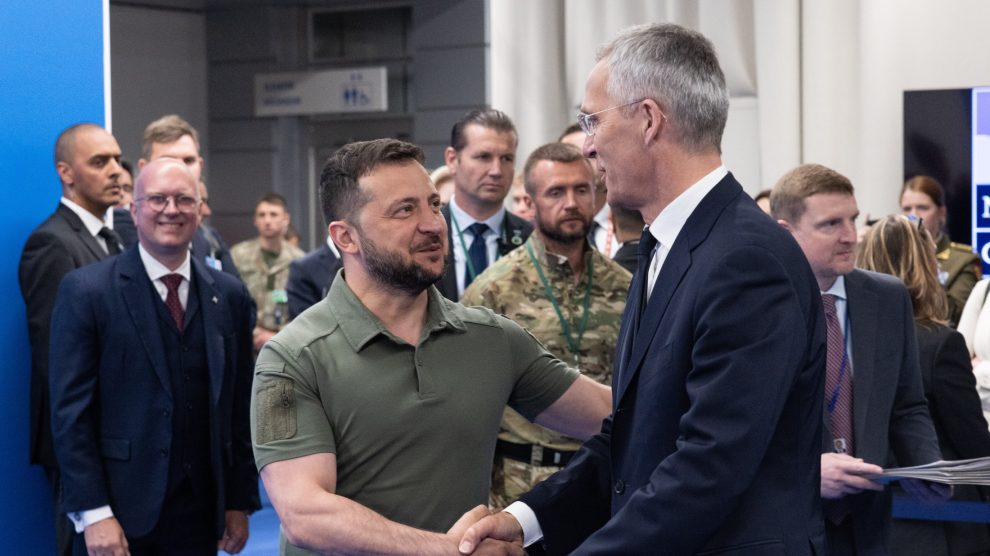Volodymyr Zelensky travelled to NATO’s summit in Vilnius in the hope that the alliance would provide him with a clear idea of when Ukraine might become a member of the alliance. Though he smiled for the cameras, he left disappointed.
The vague language in the communiqué released by NATO at its Vilnius summit this week differs little from the words used in a similar statement made in Bucharest in 2008.
Then, both Ukraine and Georgia had been hoping to be given a NATO membership action plan – a formal roadmap to full membership. Instead, in the presence of Russian President Vladimir Putin, an invitee to that summit, they were given vague assurances that they would become NATO members “at some stage in the future”.
- At Vilnius summit, Ukraine hopes for more than vague assurances of eventual NATO membership
- Priorities and financing of Ukraine’s reconstruction
- Who fears a weak Russia?
Such vague assurances proved no deterrent. Just months later, Russia invaded Georgia and continues to occupy a fifth of Georgian territory. In the years since, Russia has gone further, annexing Ukraine’s Crimean Peninsula and parts of the Donbas region in 2014. In February 2022 it launched a full-scale invasion of Ukraine.
This week in Vilnius, the only real difference was the absence of Putin.
While Kyiv was told that it would no longer need a membership action plan, NATO declaring that Ukraine has “moved beyond” the need for one, NATO added that will only be able to extend an invitation to Ukraine to join the alliance “when Allies agree and conditions are met”.
It made no mention of when that might be, or indeed what those conditions might be.
Jens Stoltenberg, NATO’s secretary-general, tried to spin the communiqué as positively as possible, saying that it would streamline the accession process and make Ukraine’s membership dependent on a purely political decision.
“This will change Ukraine’s membership path from a two-step process to a one-step process,” he said on July 11, the first day of the summit.
Ukraine’s president, Volodymyr Zelensky, was unimpressed. “A window of opportunity has been left to bargain Ukraine’s membership of NATO in negotiations with Russia,” he said.
‘Absolutely insufficient’
Following direct discussions with Stoltenberg the next day, the Ukrainian president was slightly more upbeat.
The results of the summit are good, but if there was an invitation, they would be perfect,” he said. “Ukraine understands that it cannot [become] a NATO member during a war. But clear signals that this will happen were heard confidently today.”
He also spoke optimistically about a new NATO-Ukraine Council, a forum where Ukraine and NATO allies will meet as equals, hold crisis consultations and jointly take decisions.
“[The Council] is not just a tool for participation, it is a tool for integration,” said Zelensky. “And it gives us the feeling that we will be part of the alliance.”
Nevertheless, Ukraine and its closest allies ultimately left Vilnius disappointed that the wording of the communiqué was not stronger.
Polish President Andrzej Duda said that the declaration on Ukraine was “absolutely insufficient”, while Estonia’s prime minister, Kaja Kallas, said that she could “understand Ukraine’s frustrations”.
Duda and Kallas have been two of the staunchest advocates of Ukrainian NATO membership, along with the UK, France, and most of the countries of Central and Eastern Europe. The US and Germany meanwhile have taken a more circumspect approach.
Zelensky met privately with Joe Biden on July 12, no doubt in a bid to find out exactly when the US president believes Ukraine’s membership of NATO will be possible.
Thanking the US for ongoing military aid, including Biden’s decision last week to approve the supply of cluster munitions to Ukraine, Zelensky said, “The meeting was at least twice as long as planned, and it was as meaningful as it needed to be”.

‘There will be weapons’
According to NATO chief Stoltenberg, “the most urgent task now is to ensure Ukraine has enough weapons”. This has so far proven to be difficult. As NATO leaders met in Vilnius, it was being reported that Ukraine’s ammunition use is “staggering”, with an estimated 2,000 to 7,000 artillery shells fired per day.
While still a fraction of Russia’s use, thought to be 20,000 and 50,000 per day, the rate is enough to worry NATO officials, who say they never planned for conflicts with such an intense use of artillery systems and massive deployment of tank and gun rounds.
In that regard, Ukraine did not leave Vilnius empty handed.
Meeting on the sidelines of the summit, leaders of the G7 countries (Canada, France, Germany, Italy, Japan, the UK and the US) agreed a package of new bilateral assurances of military and economic support for Ukraine, to deter Russian aggression before it joins NATO.
The package will include more air defence, long-range missiles and even warplanes, as well as more training, intelligence sharing and help with cyber technology. Zelensky called the package “a significant security victory.”
One of his key advisors, Mykhailo Podolyak, said that the main conclusions of Vilnius had been: “there will be weapons, there will be support, there will be a sovereign and independent Ukraine. One day, Ukraine will definitely join NATO.”
“Until then, let us remember: our lives and security are only in our hands. We thank our partners, but we also remind them that the future and security of Europe is also in our hands. And today, these hands are covered with terrible bloody calluses from the constant holding of weapons.”
Photo: NATO
Unlike many news and information platforms, Emerging Europe is free to read, and always will be. There is no paywall here. We are independent, not affiliated with nor representing any political party or business organisation. We want the very best for emerging Europe, nothing more, nothing less. Your support will help us continue to spread the word about this amazing region.
You can contribute here. Thank you.







Add Comment